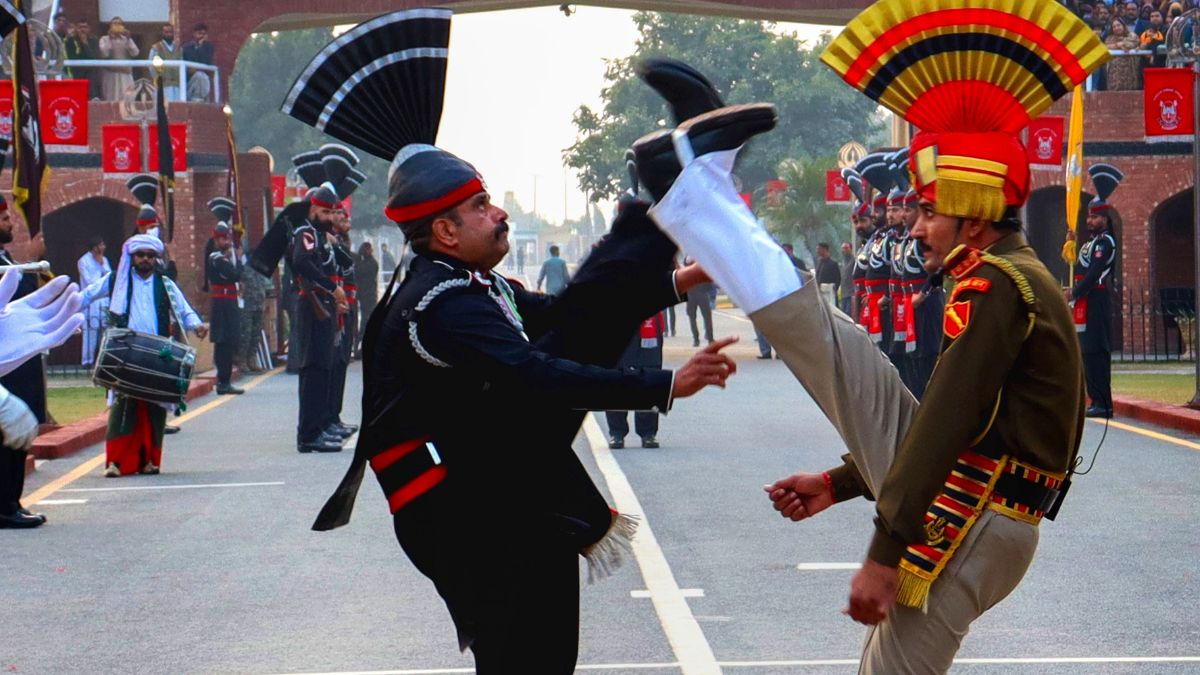India and Pakistan have downgraded ties in the wake of the Pahalgam terror attack. In a tit-for-tat move, both countries have announced several measures against each other, including suspending key treaties.
India will also close the Integrated Check Post at the border in Attari, a village in Punjab’s Amritsar. Following this, Pakistan announced it would shut the Wagah border, a few kilometres from Lahore, with India. The closure of the international border between the two countries will impact trade and the movement of people.
The Attari-Wagah border is known for its Beating Retreat Ceremony that draws thousands of visitors every day. However, as anger in India remains high over the Pahalgam terror attack that left 26 people dead, some have now demanded scrapping the ceremony altogether.
What is this ceremony? What is its importance? Let’s take a closer look.
What’s Beating Retreat Ceremony?
India and Pakistan have been performing the Attari-Wagah border retreat ceremony daily since 1959. The Border Security Force (BSF) and Pakistan Rangers carry out a synchronised drill, including high kicks, stomping and energised salutes.
Also known as the Wagah Border Ceremony, the choreographed routine begins at 4.30 pm with BSF personnel and Pakistani Rangers marching forward. Their every step conveys power, filling thousands of people who visit the border to witness the ceremony with pride and nationalism.
After 20 minutes, soldiers of both nations meet at the border gates, lock their eyes and then shake hands. Indian and Pakistani flags are lowered simultaneously before the sun sets.
Impact Shorts
More ShortsThe ceremony first began as a simple military routine for lowering flags, but eventually turned into a theatrical event. “Over the years, it has evolved into a vibrant, daily display of patriotism that subtly reinforces the enmity between the two countries,” according to the independent think tank Lowy Institute.
The popular ceremony attracts roughly 25,000 to 50,000 spectators daily. While Indians fill the air with “Bharat Mata ki Jai!” slogans, Pakistan nationals on their side of the border shout “Pakistan Zindabad!”
The drill is symbolic of the rivalry between the two neighbours as well as mutual recognition.
The ceremony was toned down in 2010 to reduce hostility by including a formal handshake. Soldiers on both sides of the border also exchange sweets during Eid and Diwali. Similar ceremonies are performed at border points like Hussainiwala near Ferozepur and Sadki near Fazilka in Punjab.
Calls to stop the retreat ceremony
Some Indians have been demanding an end to the Beating Retreat Ceremony at the Attari-Wagah border.
Shiv Sena (UBT) MP Priyanka Chaturvedi is among those calling for stopping the ceremony in the wake of the deadly Pahalgam attack.
“Stop the Beating Retreat ceremony at the India-Aatankistan border. Stop the release of any movie starring Aatankistani actors. Stop any of these cricket matches that we have with Aatankistan — BCCI, it is high time to stand up for the nation over your profits,” the Rajya Sabha MP wrote in a post on X, referring to Pakistan.
Lt Gen KJS Dhillon (retired), an expert on Kashmir and military strategy, also objected to the retreat ceremony, terming it “drama”.
“This ‘nautanki’ must stop. This is not a military parade. Beating the Retreat is a very solemn ceremony. Let’s not call this drama the Beating Retreat. Jai Hind,” he said on X.
On Thursday (April 24), the Border Security Force (BSF) said the retreat ceremony at Attari, Hussainiwala, and Sadki borders with Pakistan will be scaled down. It said there will be no handshake and the gates will remain closed during the ceremony.
In a post on X, the BSF said that in the aftermath of the Pahalgam terror attack, a “calibrated decision has been taken to scale down the ceremonial display during the Retreat Ceremony” at these borders with Pakistan.
“The key changes include: Suspension of the symbolic handshake of the Indian Guard Commander with the counterpart Guard Commander. Gates to remain closed during the ceremony. This step reflects India’s serious concern over cross-border hostilities and reaffirms that peace and provocation cannot coexist,” the statement added.
There are reports that India could suspend the ceremony entirely. However, it remains to be seen if that happens.
With inputs from agencies


)

)
)
)
)
)
)
)
)



